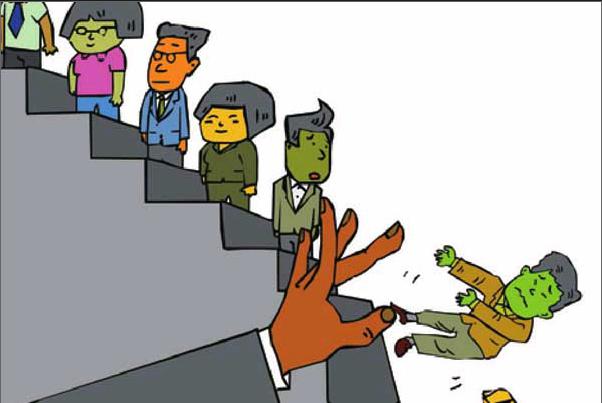Does Eliminating Low-Scoring Employees Improve Business Performance?

The Supreme Peoples Court recently issued a regulation forbidding employers from unilaterally ending labor contracts for the purpose of laying off employees graded last in performance evaluations or in other kinds of competition for positions. In such cases, workers now have the right to demand that their employer continue the contract or offer compensation.
The practice of eliminating those who come last—widely referred to as the “worst will be eliminated” mechanism—has sparked heated debate. Supporters claim that this incentive helps strengthen employees sense of competition and urgency and that, with everyone trying their best to do their job well, it undoubtedly boosts company performance. Furthermore, the reasoning goes, people who are really capable never worry about being eliminated.
However, opponents argue that the mechanism throws the whole staff of a company into fierce competition, with everyone viewing each other as a rival. This kind of internal competition consumes a significant portion of a firms resources and means that its people can never work well as a team. The seemingly effective elimination mechanism ultimately hurts the companys development.
Inhumane and law-breaching
Chen Qingpu (www.epaper.tianjinwe.com): The staff of any company will always have an inferior member, measured according to some standard or another. No matter how great a team is, you can always find someone within the group who is the least effective. But then, you should not automatically label some as the worst. The method of assessment may not be very scientific, and there are many subjective factors that affect appraisal results.
Implementing the “worst will be eliminated”mechanism undoubtedly deals a heavy blow to the one who is tagged as inferior, worst or last. Its quite possible that this “inferior” person actually works very hard and devotedly.
The elimination mechanism is an inhumane evaluation method, which distances working staff from their companies. Ostensibly, eliminating the inferior helps to boost company performance, but such a cold-blooded corporate culture hurts a firms development in the long run.
In the relationship between employer and employee, the latter is usually at a disadvantaged position. Some companies that brag about the positive effects of eliminating under-performers actually just want to get rid of employees they no longer want to keep. In such cases, the law should support workers in fighting for their legitimate rights. Of course, no company is supposed to accommodate lazy and inefficient employees, and employers have the right to dismiss employees, but they need to do so in accordance with the law instead of by simply resorting to the practice of elimination, which has now been made illegal.
Hu Jianbing (www.ce.cn): In companies that frequently practice elimination, employees tend to distrust each other. People who are good at their jobs but not particularly skilled at getting along with others may risk being eliminated. Incapable workers, meanwhile, may be too busy managing their relations with their superiors and human resources personnel to improve their work skills.
It sometimes happens that the more work someone does, the more mistakes they make, and those who choose to stick to their principles tend to offend more people. Such employees are not inferior to anyone, but nonetheless, theyll easily get squeezed out, and this will actually cause a loss to employers.
Shi Jing (Nanfang Daily): There is still no definitive proof that companies which strictly practice the elimination mechanism outperform others. In an environment characterized by tense relations among staff and between the employer and employee, we can hardly imagine the kind of unity and dedication required for successful teamwork. In the end, its the companies that get hurt.
The new regulation of the Supreme Peoples Court actually reminds companies that its better to try to create a harmonious corporate culture and encourage employeesdedication to the organization than to take advantage of legal loopholes. A good corporate culture, rather than cold-blooded elimination, is what will benefit employer and employee alike.
Li Guomin (Procuratorial Daily): The mechanism of eliminating inferior employees used to be implemented by many organizations and enterprises as a means of incentivizing staff. In practice, however, more and more defects in this approach have become apparent. It throws every staff member into a cruel environment of competition, pitting one against another.
From a legal perspective, the worst case scenario involving the elimination system is that it may be abused to the detriment of workerslegitimate rights and interests. For example, LeTV, a YouTube-like online video platform in Beijing, is apparently going to lay off 10 percent of its staff at the end of the year. When questioned about the move, the company said it is a regular practice every year as the firm makes redundant staff members who are graded last in terms of performance. In this case, the employer equates laying off employees with eliminating the inferior. LeTVs practice is exactly what the Supreme Peoples Court targets: the unilateral cancellation of employment contracts in the name of eliminating inferior workers. But no one should be allowed to infringe upon workers legitimate rights and interests in the guise of weeding out incapable workers.
Zhang Yusheng (Changsha Daily): Day to day, employers often use “eliminating the inferior” as a pretext for dismissing workers. Disguised as a fair practice, this approach of making employees redundant is seldom challenged by those who are unfairly treated, namely, the fired workers.
As long as competition and performance ranking exist in companies and organizations, someone is bound to come last. But ‘last does not necessarily mean unqualified.
Modern corporate governance stresses the importance of tapping into workforce potential by creating an environment that can bring everyones advantages into play. Elimination of those who rank last runs contrary to this concept. While workers should bravely take up legal arms to protect their rights, the legal system should also back them up.
A good incentive mechanism
Liu Ruiming (Qilu Evening News): In the context of fierce market competition, businesses must adopt certain incentive policies to fully tap into staff potential and boost their performance. The practice of laying off employees who are graded last in performance evaluations aims to encourage staff to be more industrious. After scientific appraisal, companies classify and rearrange employees according to the results. Those who rank last are demoted, moved to other posts or fired. This is a normal incentive in a market environment.
The ultimate goal of such a mechanism is not to get rid of employees, but to stimulate the company vitality. Generally speaking, employees graded worst at a certain level will be demoted and will be made redundant only when they are unfit even for the simplest work at the lowest level.
Actually, capable and devoted employees have no fear of elimination. They will never rank last in performance evaluations, and rather than kicking them out, their employers will try to retain them with high pay and generous welfare benefits. Even if such a person were fired, they would soon be able to find good job. Only incapable and lazy employees fear elimination. They argue for an“iron rice bowl,” but a company packed with such people will eventually be eliminated by market competition.
The staff of state-owned enterprises, in particular, face little competition and benefit from having an “iron rice bowl.” As a result, the performance of such organizations remains poor, with the potential to eventually lead both the company and its workforce into adversity. In this case, the practice of elimination is used too little, not too much.

